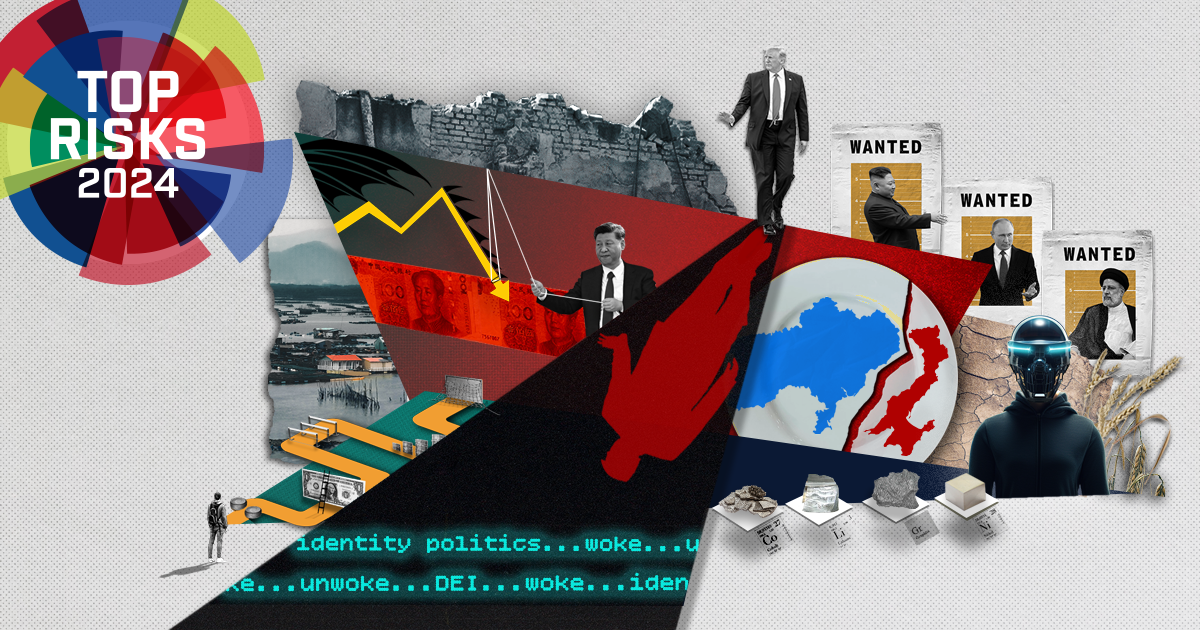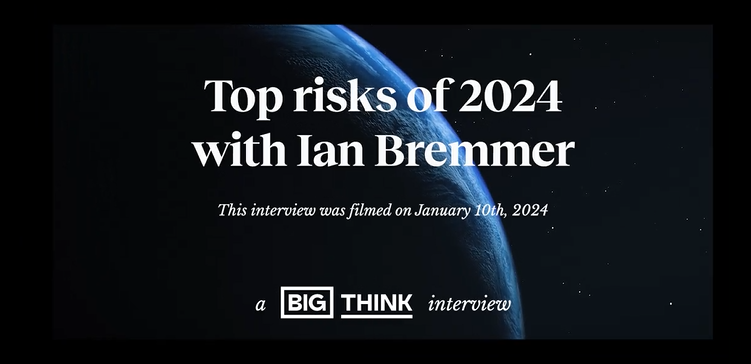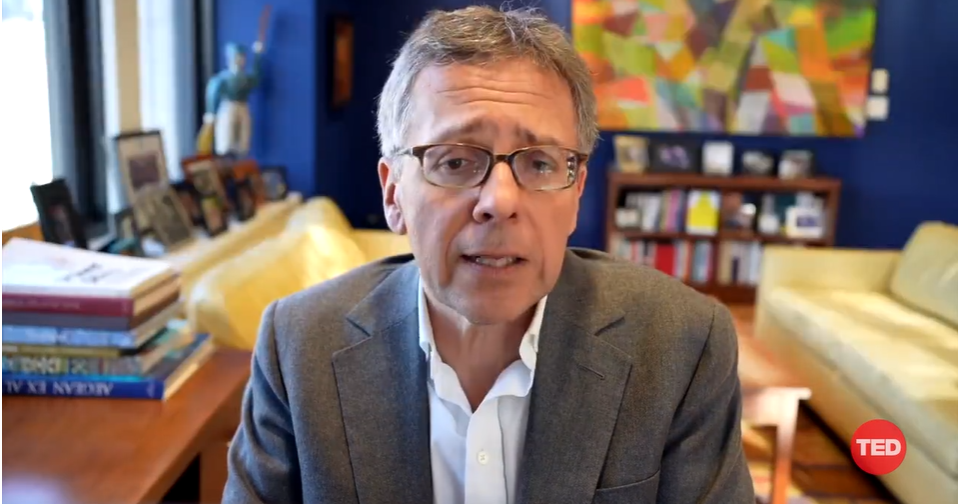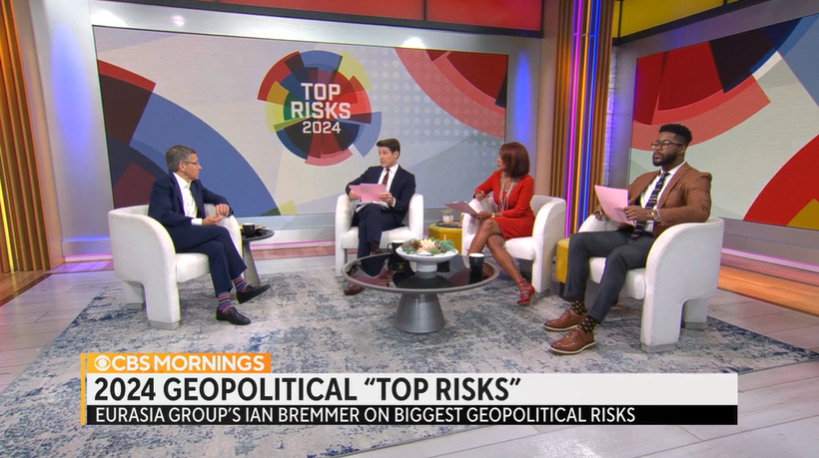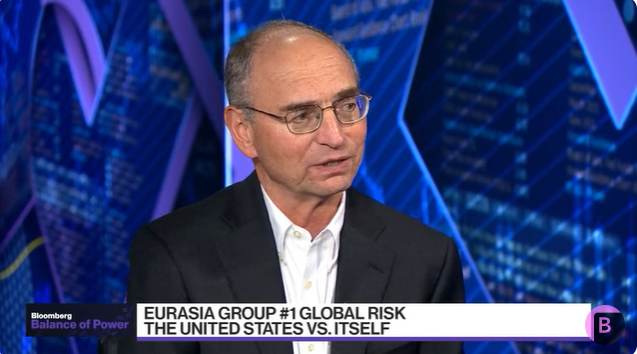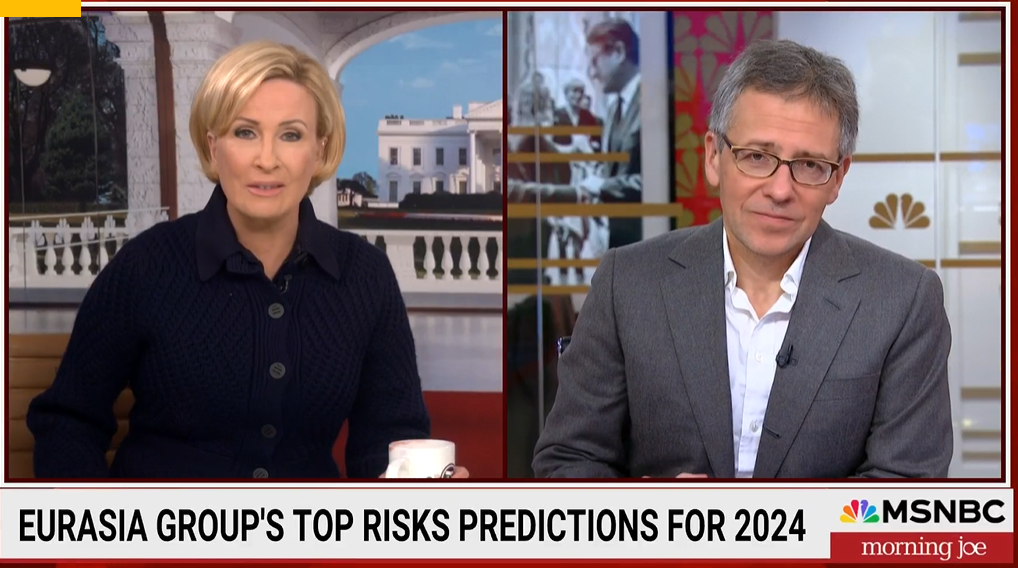Overview2024. Politically it's the Voldemort of years. The annus horribilis. The year that must not be named.
Three wars will dominate world affairs: Russia vs. Ukraine, now in its third year; Israel vs. Hamas, now in its third month; and the United States vs. itself, ready to kick off at any moment.
Russia-Ukraine … is getting worse. Ukraine now stands to lose significant international interest and support. For the United States in particular, it's become a distant second (and increasingly third or lower) policy priority. Despite hundreds of thousands of casualties, millions of displaced people, and a murderous hatred for the Russian regime shared by nearly every Ukrainian that will define the national identity of tens of millions for decades. Which is leading to more desperation on the part of the Ukrainian government, while Vladimir Putin's Russia remains fully isolated from the West. The conflict is more likely to escalate, and Ukraine is on a path to being partitioned.
Israel-Hamas … is getting worse. There's no obvious way to end the fighting, and whatever the military outcome, a dramatic increase in radicalization is guaranteed. Of Israeli Jews, feeling themselves globally isolated and even hated after facing the worst violence against them since the Holocaust. Of Palestinians, facing what they consider a genocide, with no opportunities for peace and no prospects of escape. Deep political divisions over the conflict run throughout the Middle East and across over one billion people in the broader Muslim world, not to mention in the United States and Europe.
And then there's the biggest challenge in 2024 … the United States versus itself. Fully one-third of the global population will go to the polls this year, but an unprecedentedly dysfunctional US election will be by far the most consequential for the world's security, stability, and economic outlook. The outcome will affect the fate of 8 billion people, and only 160 million Americans will have a say in it, with the winner to be decided by just tens of thousands of voters in a handful of swing states. The losing side—whether Democrats or Republicans—will consider the outcome illegitimate and be unprepared to accept it. The world's most powerful country faces critical challenges to its core political institutions: free and fair elections, the peaceful transfer of power, and the checks and balances provided by the separation of powers. The political state of the union … is troubled indeed.
None of these three conflicts have adequate guardrails preventing them from getting worse. None have responsible leaders willing and able to fix, or at least clean up, the mess. Indeed, these leaders see their opponents (and their opponents' supporters) as principal adversaries—“enemies of the people”—and are willing to use extralegal measures to ensure victory. Most problematically, none of the belligerents agree on what they're fighting over.
Climate change has long been considered by many our greatest global challenge, but the world is on the road to responding—collectively, even though too slowly—because everyone understands the nature of the problem. There is too much carbon (and methane) in the atmosphere, with a lot more coming because it's necessary for economic growth, leading to long-term damage to biodiversity and affecting everyone but mostly the poorest. None of this remains controversial: it's just a question of who compromises how much—and who pays what and when. We have a pretty good sense of where we are heading accordingly.
Not so for any of the major conflicts driving geopolitical risk this year. The terms of confrontation are not shared: not the narratives, not the history, not even the basic facts of the ongoing fighting. And in all three cases, we are creating generations of incensed people prepared to dig in and battle for as long as it takes. Maybe an end to the fighting can come when one or both sides are exhausted … but the prospects of a sustainable peace? In Europe, in the Middle East, and in America, we're not remotely close.
We call this a G-Zero world, a world without global leadership. Where the United States, the world's sole remaining superpower, doesn't want to be the world's policeman, the architect of global trade, or the cheerleader of global values. And no other country is prepared to take that role for itself. We now see three major confrontations that are the direct result of our G-Zero world. By its nature, the G-Zero will cause more unsolvable conflicts in the years ahead—the only questions are where, when, and how destabilizing. And whether the resulting crises help fix the underlying problem with our “geopolitical recession” or only serve to make it worse.
*
There are plenty of bright spots. Most of the rest of all those elections, especially the big ones (India, the European Union, Indonesia, Mexico), aren't troubled at all. And then there's a big issue you might find surprising since it's less gloomy than usual: The US and China will be the adults in the room this year. With all the fighting going on in the world, the two biggest economies aren't looking for reasons to start another conflict, despite the lack of trust and mutually unaligned political and economic systems. US-China tensions don't even make the Top Risks list, in part because the Chinese economy and the US domestic polity are so troubled and distracting. Geopolitically, the world's most strategically consequential bilateral relationship has become a cleaner dirty shirt.
The wild card, more than ever, is technology—specifically, artificial intelligence. The upsides will start materializing more dramatically as new applications find their way into every major corporation across every economic sector. And as hundreds of millions of people begin to upskill themselves in their jobs, AI will become a copilot before it takes over your job. But the technology is also developing far faster than the ability to govern it, and a technopolar world for artificial intelligence means crisis response and reaction will come only after things break … let's hope in 2024 those things aren't that big.
And now, our top risks.
Risk 1: The United States vs. itself
The 2024 election will test American democracy to a degree the nation hasn’t experienced in 150 years.
Risk 2: Middle East on the brink
The region is a tinderbox, and the number of players carrying matches makes the risk of escalation exceptionally high.
Risk 3: Partitioned Ukraine
Ukraine will be de facto partitioned this year, an unacceptable outcome for Ukraine and the West that will nevertheless become reality.
Risk 4: Ungoverned AI
Breakthroughs in artificial intelligence will move much faster than governance efforts.
Risk 5: Axis of rogues
Deeper alignment and mutual support between Russia, Iran, and North Korea will pose a growing threat to global stability.
Risk 6: No China recovery
Any green shoots in the Chinese economy will only raise false hopes of a recovery as economic constraints and political dynamics prevent a durable growth rebound.
Risk 7: The fight for critical minerals
The scramble for critical minerals will heat up as importers and exporters intensify their use of industrial policies and trade restrictions.
Risk 8: No room for error
The global inflation shock that began in 2021 will continue to exert a powerful economic and political drag in 2024.
Risk 9: El Nino is back
A powerful El Nino climate pattern will bring extreme weather events that cause food insecurity, increase water stress, disrupt logistics, spread disease, and fuel migration and political instability.
Risk 10: Risky business
Companies caught in the crossfire of US culture wars will see their decision-making autonomy limited and their cost of doing business rise.
Red Herrings
US-China crisis. Populist takeover of European politics. BRICS vs. G7. 2024 Red Herrings.
conclusion
It's critical we don't just talk about these global issues to help make business and policy decisions, but also to connect with those closest to us. If we can't make a difference with those we know and love, we're lost.
One of us (Ian) just returned from the South Pole. Having the entire world on my shoulders—even if for just a moment—felt like the right thing to do to prepare for the year. Antarctica is an entire continent that's been kept peaceful and pristine, for humanity and our animal friends, for generations now. Yeah, we're melting it. But otherwise, it turns out we can be capable global custodians when we set our minds to it.
Let's remember that. Thinking about the year ahead of us, we're not that into Mars. We're focused on doing a better job with the planet we're on first.
With our best wishes to you for our year ahead,
Ian and Cliff














